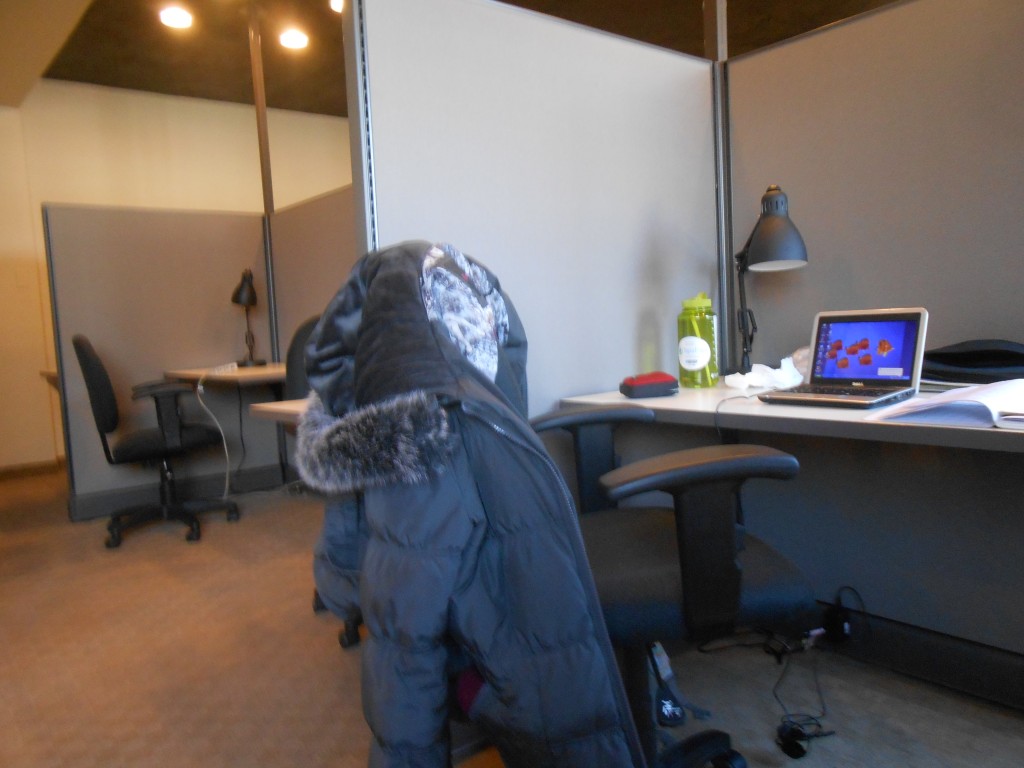In a prior post, I noted that silence makes me restless; that I need a bit of noise, the strange–or at least the different–to stimulate my imagination when I write. Lately, though, I’ve just been restless, plain and simple. So I’ve decided, for at least the first three months of 2013, to embark on an “environmental” experiment. I’ve started writing at The Writers Room D.C.
Created in the fall of 2012, and apparently modeled on the writers’ rooms they have in New York (quite a few in Brooklyn, I must say!), the Writers Room D.C. is one large room, a wall of windows on one side, with 18 two-sided cubicles containing desks and lamps, in which serious writers (published or emerging) can have their own little writer’s space away from home and home’s distractions. There’s a small open space where one can take a break to relax and read, and an anteroom with a little kitchenette (with a supply of coffee, tea, a small refrigerator, and a sink–restrooms are down the hall); lockers (where you can store your computer and/or work rather than carry them back and forth each day); a printer (for small jobs); and a small side room in which to make phone calls. Oh–and you can bring coffee or tea into your writing space, but food must be consumed in the kitchenette.
For me, who usually needs the sense of freedom that wandering gives and the ambient noise of coffee shops–not to mention nibbling as I write–this is a new way of working. The immediate difficulty for me so far, of course, is the utter quiet in the work-area. Though it may be a self-imposed reaction on my part, it feels like an enforced silence–like if I laugh at something I’m reading, I have violated it. And sometimes, going feels like obligation, like I’d rather be out having an adventure. But then again, who’s making me go? –Me.
On the plus side, going there does seem to be getting me to follow more of a regular work-schedule, and working side by side with others doing the same does alleviate that sense of isolation I feel when trying to work at home. In addition, people will chat for a bit when they break to get coffee, and the founders are creating some small social events to help us to get to know each other. Also, I don’t have to pack up my computer every time I need to go to the ladies room–a more important plus than one might think.
So how is the experiment working out for me? It’s early days yet. I’ve only been at it for about three weeks. The proof will be in the pudding, as they used to say. We’ll see how much I get written (of quality) in these three months. So far, I have found that, although the silence is generally disturbing when I come in, once I get into the work, I can, to a degree, get engrossed in what I’m writing and forget that it is so quiet. I do think that, for me, a writers’ room’s greatest strength is also its greatest weakness. That is, working side by side with other writers removes that sense of isolation, but when one is surrounded by other like-minded people, one is deprived of access to the unexpected encounter that provides new ideas. Eventually, I will have to find some way to balance my time there with my need for the creative stimulation wandering gives. I’m not used to bifurcating my time in that way. But that doesn’t mean that I can’t learn to.

